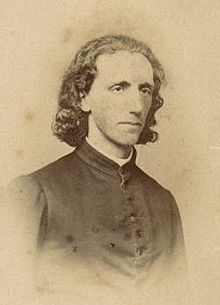Descriptive psychology (Brentano)
| Franz Brentano | |
|---|---|
 |
|
| Born | 16 January 1838 Marienberg am Rhein, Rhine Province, Prussia |
| Died |
17 March 1917 (aged 79) Zürich, Switzerland |
| Alma mater |
University of Munich University of Berlin University of Münster University of Tübingen (PhD, 1862) University of Würzburg (Dr.hab., 1866) |
| Era | 19th-century philosophy |
| Region | Western Philosophy |
| School |
School of Brentano Intentionalism ("act psychology") Empirical psychology Austrian phenomenology Austrian Realism |
| Institutions |
University of Würzburg (1866–1873) University of Vienna (1873–1895) |
|
Main interests
|
Ontology Psychology |
|
Notable ideas
|
Intentionality, intentional object, distinction between genetic and empirical/descriptive psychology, the judgement–predication distinction, time-consciousness |
|
Influences
|
|
| Franz Brentano | |
|---|---|
| Theses | |
| Doctoral advisor |
Franz Jakob Clemens (PhD adv.) |
| Other academic advisors | Adolf Trendelenburg |
| Notable students |
Sigmund Freud Alexius Meinong Kazimierz Twardowski |
Franz Clemens Honoratus Hermann Brentano (/brɛnˈtɑːnoʊ/; German: [bʀɛnˈtaːno]; 16 January 1838 – 17 March 1917) was an influential German philosopher, psychologist, and priest whose work strongly influenced not only students Edmund Husserl, Sigmund Freud, Tomáš Masaryk, Rudolf Steiner, Alexius Meinong, Carl Stumpf, Anton Marty, Kazimierz Twardowski, and Christian von Ehrenfels, but many others whose work would follow and make use of his original ideas and concepts.
Brentano was born at Marienberg am Rhein, near Boppard. He was the son of Christian Brentano, the brother of Lujo Brentano, and the nephew of Clemens Brentano and Bettina von Arnim. He studied philosophy at the universities of Munich, Würzburg, Berlin (with Adolf Trendelenburg) and Münster. He had a special interest in Aristotle and scholastic philosophy. He wrote his dissertation in 1862 at Tübingen under the title Von der mannigfachen Bedeutung des Seienden nach Aristoteles (On the Several Senses of Being in Aristotle). His thesis advisor was Franz Jakob Clemens. Subsequently he began to study theology and entered the seminary in Munich and then Würzburg. He was ordained a Catholic priest on 6 August 1864.
...
Wikipedia
